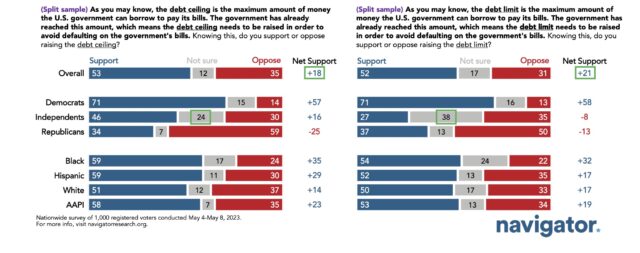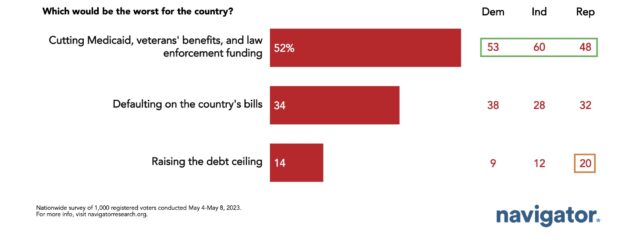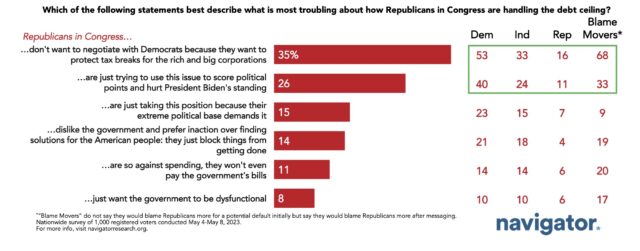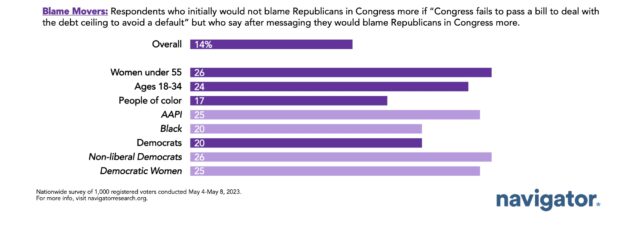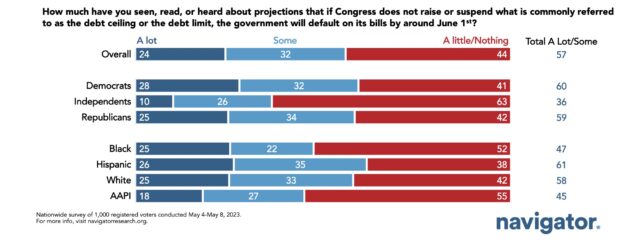- Americans feel cuts to programs like Medicaid or default would be worse outcomes for the country than raising the debt ceiling.
- Nearly three in five oppose Republicans in Congress’ plan, and the most concerning outcomes include cuts to: Medicaid, funding for food safety inspectors (leading to food shortages/higher costs), and education funding.
- The most troubling statements about how Republicans are handling the debt ceiling include their tax cuts for the rich and using the issue to score political points against Biden.
Majorities Support Raising the Debt Ceiling/Limit After Learning Failure to Do So Would Mean Default
Higher shares of Americans are unsure on the “debt limit,” including 17% overall (compared to 12% not sure on the “debt ceiling”), 38% of independents (compared to 24%), and 13% of Republicans (compared to 7%).
Cutting Medicaid and Other Programs or Defaulting Seen As Worse Outcomes for U.S. Than Raising the Debt Ceiling
Americans across party lines say that “cutting Medicaid, veterans’ benefits, and law enforcement funding” would be the worst outcome.
- Only one in five Republicans (20%) say that “raising the debt ceiling” would be the worst for the country.
The Public Rejects the GOP’s Latest Plan Only When Details Are Explained
Explaining the specifics of Republicans’ proposed cuts erodes support from roughly even (net +1 support) to a 29-point deficit, with the largest declines among those hearing “a little” or “nothing” about a default (from net +3 to net -39) and Republicans (from net +66 to +20).
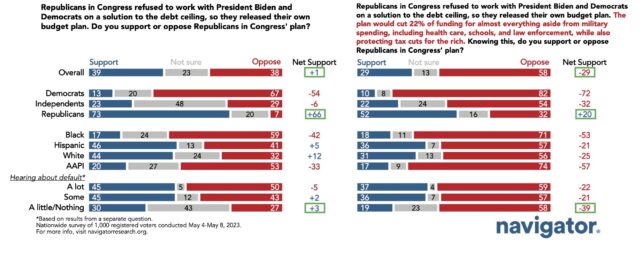 Cuts to Medicaid, Threats to Grocery Costs, and Cuts to School Funding Most Concerning Parts of Republicans’ Debt Plan
Cuts to Medicaid, Threats to Grocery Costs, and Cuts to School Funding Most Concerning Parts of Republicans’ Debt Plan
Among those who shift to blame Republicans more for a potential default after reading more information*, fully 100% say they find the move to “take Medicaid away from as many as 21 million people” either “very” or “somewhat concerning.”
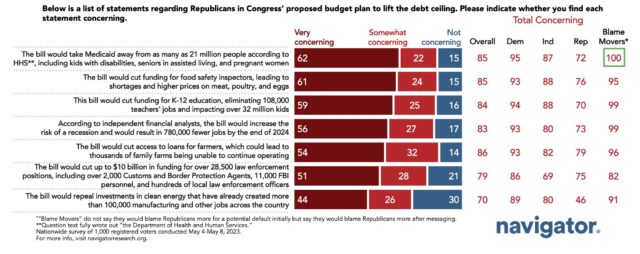 Republicans’ Protection of Tax Breaks for the Rich and Using the Issue to Score Political Points Most Troubling on Debt Ceiling
Republicans’ Protection of Tax Breaks for the Rich and Using the Issue to Score Political Points Most Troubling on Debt Ceiling
Americans who shift to blame Republicans for a potential default after messaging* say they find it most troubling that Republicans in Congress “want to protect tax breaks for the rich” (68% top two) and are “just using this issue to score political points” (33%).
Americans Trust Republicans More on Avoiding Default on the National Debt, Though Many Are Unsure
Independents trust the Republican Party more on “avoiding default on the national debt” (net -15 Biden and Democrats), though nearly three in five (57%) don’t know enough to say. Americans who report hearing “a little” or “nothing” about a potential default on a separate question are less likely to trust Biden and Democrats (net -16), though 34% don’t know enough to say.
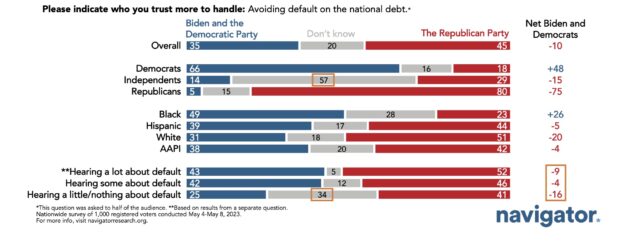 The Public Swings from Blaming Democrats Slightly More on Debt Ceiling to Blaming Republicans More After Messaging
The Public Swings from Blaming Democrats Slightly More on Debt Ceiling to Blaming Republicans More After Messaging
After messaging, the share who blame Republicans most for a potential default increases from 28% to 40%; independents in particular shift from blaming Democrats by net 9 points to blaming Republicans by net 9 points (and 18-point swing), though still 47% blame both equally.
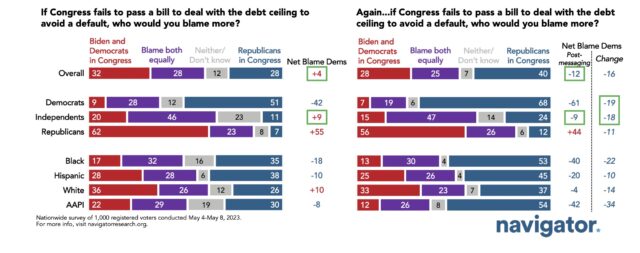 Those Who Shift to Blame Republicans Most for a Potential Default Tend to Be Younger, People of Color, Democrats
Those Who Shift to Blame Republicans Most for a Potential Default Tend to Be Younger, People of Color, Democrats
Women under 55 (26%) and Americans ages 18-34 (24%) most disproportionately fall into this group, while only 5% of seniors 65+ fall into this category. People of color (17%) are also more likely to fall into this group than white Americans (12%).
- This group also reports hearing less about a potential default, with only about one in three blame movers (35%) saying they are hearing “a lot” or “some” about it, compared to 57% of Americans overall.
Only One in Four Have Heard “a Lot” About the Government’s Default Timeline, Three in Five at Least “Some”
Democrats (60% hearing “a lot” or “some”) and Republicans (59%) report hearing more about the potential default next month than independents (36%), though just 28% of Democrats and 25% of Republicans have heard “a lot” about it.
About The Study
Global Strategy Group conducted public opinion surveys among a sample of 1,000 registered voters from May 4-May 8, 2023. 102 additional interviews were conducted among Hispanic voters. 75 additional interviews were conducted among Asian American and Pacific Islander voters. 100 additional interviews were conducted among African American voters. 100 additional interviews were conducted among independent voters. The survey was conducted online, recruiting respondents from an opt-in online panel vendor. Respondents were verified against a voter file and special care was taken to ensure the demographic composition of our sample matched that of the national registered voter population across a variety of demographic variables.

